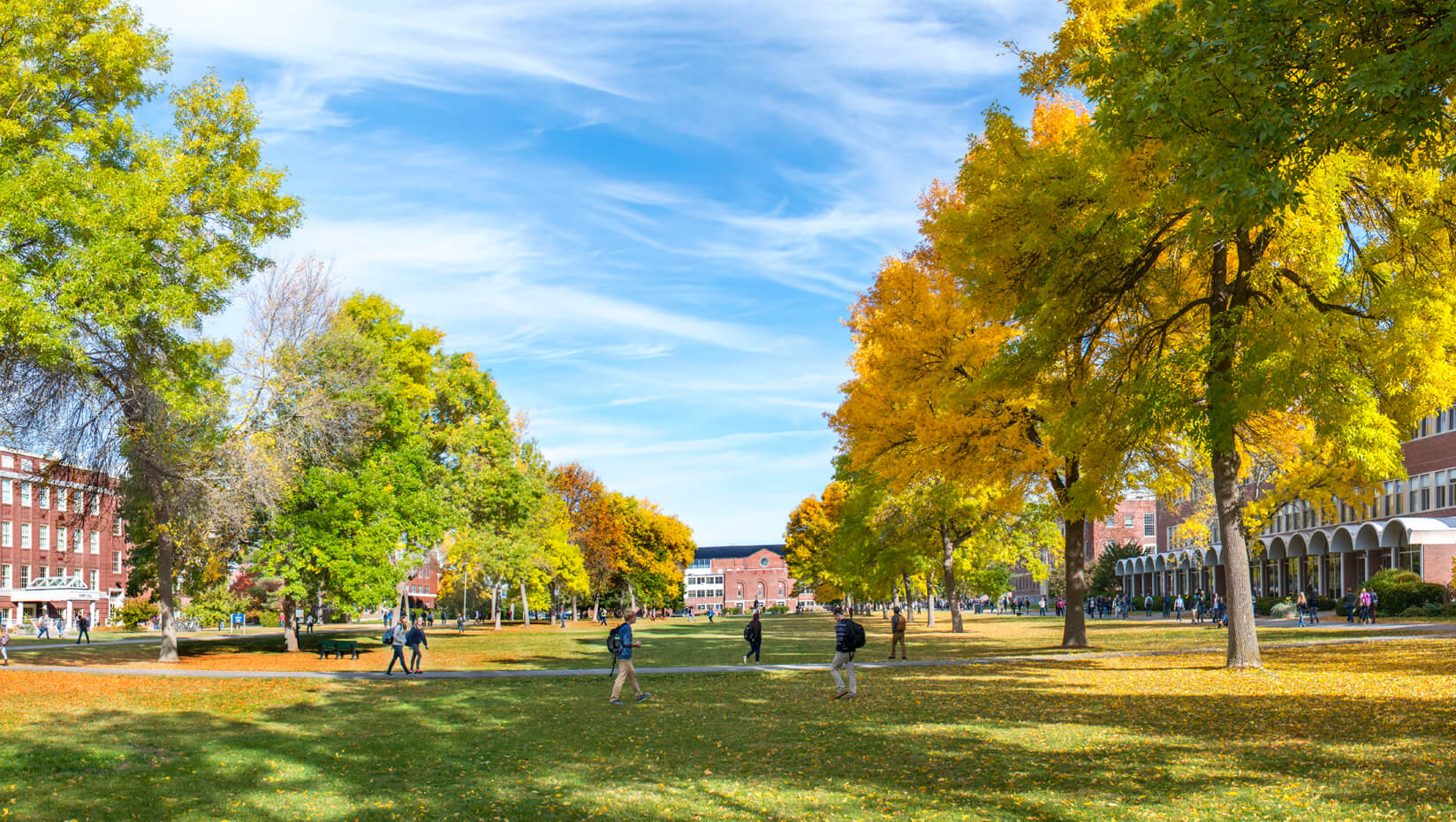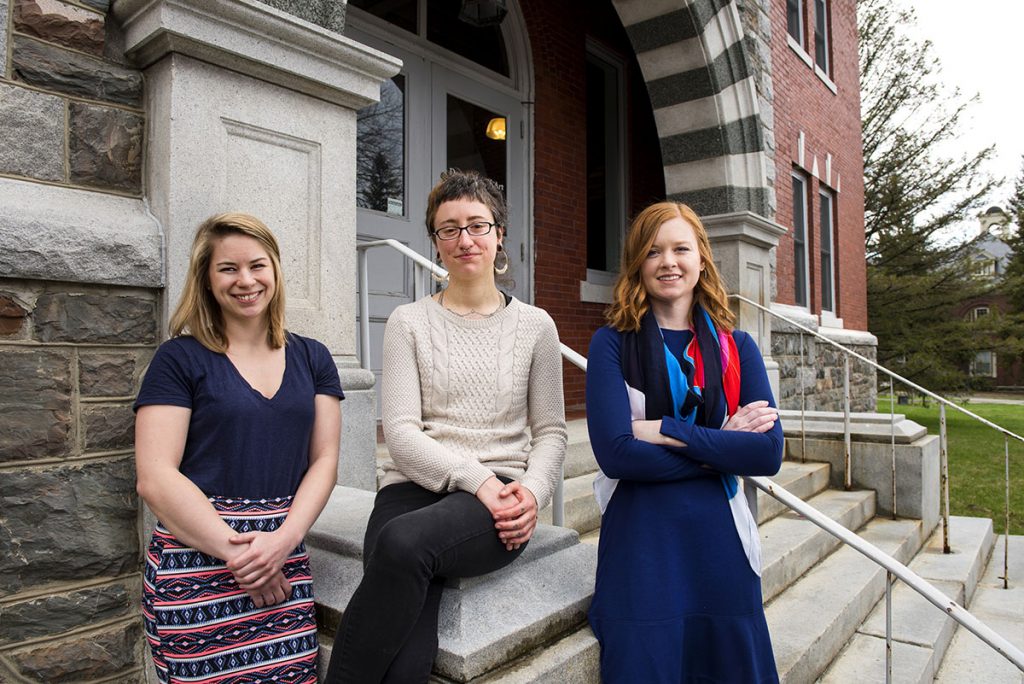
Jankowski, Kilroy, St. Amand awarded graduate research fellowships
University of Maine students Melissa Jankowski, Elisabeth Kilroy and Anne “Ani” St. Amand have been awarded graduate research fellowships because of their demonstrated potential for significant achievement in STEM fields.
The three-year National Science Foundation Graduate Research Fellowships are to promote innovation, transformative scientific breakthroughs and economic growth in the U.S.

Jankowski, of Cassville, Missouri, is pursuing a Ph.D. in clinical psychology (developmental-clinical track). She expects to earn her doctorate in 2021.
Her research focuses on peer relationships and their relationship to risk and resilience in adolescence. Specifically, Jankowski investigates the interpersonal mechanisms of risk for, and influence of, “contagious” suicide and self-harm behaviors in adolescents.
After Jankowski’s mother died of cancer, Jankowski lived with friends her last two years of high school.
“Spending so much time with peers precipitated an ongoing intrigue with the dynamics of social relationships and peer influence,” she says. “Observing my peers from the inside and out led me to become interested in how particular health-risk behaviors emerged within the social context of their families and other peer relationships.”
Jankowski analyzed differences between friends who were susceptible to peer influence and those who weren’t and took a mental inventory of factors that seemed protective for some and harmful for others.
After high school, Jankowski studied psychology to formally explore risk and resilience in interpersonal contexts. She earned a bachelor’s degree in psychology and minored in statistics and music at University of Missouri.
Jankowski plans to be a clinical psychology faculty member at a research institution.
“I hope to go into academia, but I have also fallen in love with clinical work from the experiences I have had in my training so far at the University of Maine,” she says. “I’m hoping to find a faculty position that will combine both aspects of my training and interests.”
Jankowski skates with the Northwood Derby Knockouts roller derby team and enjoys hiking and exploring Maine with her husband and 4-year-old son.
Kilroy, of Brewer, Maine and Charleston, South Carolina, is pursuing a doctorate in biomedical science. She expects to obtain her Ph.D. in 2020.
Kilroy’s research focuses on developing effective therapies for muscular dystrophy — a neuromuscular disease characterized by a loss in muscle mass that results in progressive muscle weakness. She’s revisiting the premise of whether strength training is beneficial or detrimental to individuals with the disease, using the zebrafish as model for muscular dystrophy.
For people with muscular dystrophy, a protein needed to build and maintain healthy muscle is missing or doesn’t function properly, which results in the muscle’s inability to contract properly. Muscles also tire more easily and individual muscle fibers atrophy.
Kilroy’s father and brother are battling a yet-to-be identified type of muscular dystrophy and medical professionals don’t know what’s causing their muscles to waste.
She became fascinated with muscles at age 6 when she played catch with her father. “I would put the ball in his hand, raise his arm up, then I would sprint maybe 20 yards out,” she says. “Dad would have just enough strength to throw the ball to me. I would catch it and sprint back to him and we would repeat it. Some days we could do this 15 times, some days only five.”
Kilroy was 11 when her dad became paralyzed after falling and she later witnessed her brother give up his freestyle skiing career because of the disease. She says he struggles now to do things that were once easy for him, including tying his shoes and pouring milk on cereal.
“Where their dreams ended, my dreams began,” she says. “You have to find passion and once you find that passion you become completely dedicated and committed.”
Kilroy’s a firm believer that people need to define their purpose. “My ‘why’ is because at 6 a.m. when my alarm goes off to head to the gym, I know there are thousands of individuals who would love to have the ability to get out of bed on their own, get dressed on their own, grab a banana and go to the gym and workout for an hour,” she says.
In the lab, Kilroy learns techniques, reads publications and pores over data. In addition to searching for a cure for muscular dystrophy and becoming an inspiring university professor, Kilroy says she’ll always be an advocate for science.
St. Amand, of Deer Isle, Maine, is pursuing a quaternary and climate sciences master’s degree and an interdisciplinary doctorate. She expects to earn her doctorate in 2021.
St. Amand explores intersections between climate change and human behavior over the last 12,000 years.
She uses geoarchaeological methods, spatial analysis and geophysical modeling to understand how past climates and environments have impacted human settlements, infrastructure and resource acquisition.
St. Amand also uses remote sensing to create land cover classification models to identify new archaeological sites. Doing this, she says, expands the archaeological record and provides new proxy evidence to enhance and refine climate reconstructions.
Her career goals include communicating science to the public and conducting research that expands knowledge of dynamic Earth systems. She also seeks to increase communities’ capacities to adapt to rapidly changing climates.
St. Amand says she was drawn to the field because the archaeological record provides an incredible wealth of information relevant to climate and environmental sciences, ecology and geology.
She enjoys the interdisciplinary nature of the research and using scientific technologies to understand past environments and human cultures.
St. Amand attended Southern Maine Community College and the University of Maine and earned a bachelor’s degree in anthropology geography, a minor in geoscience and a Geographic Information Systems Certificate.
Some of her other pursuits and interests include analytical chemistry, social justice, motorcycles and being with friends.
Contact: Beth Staples, 207.581.3777
